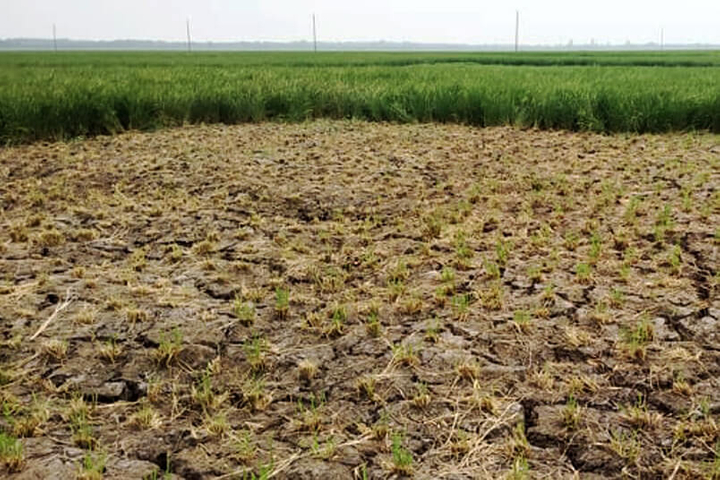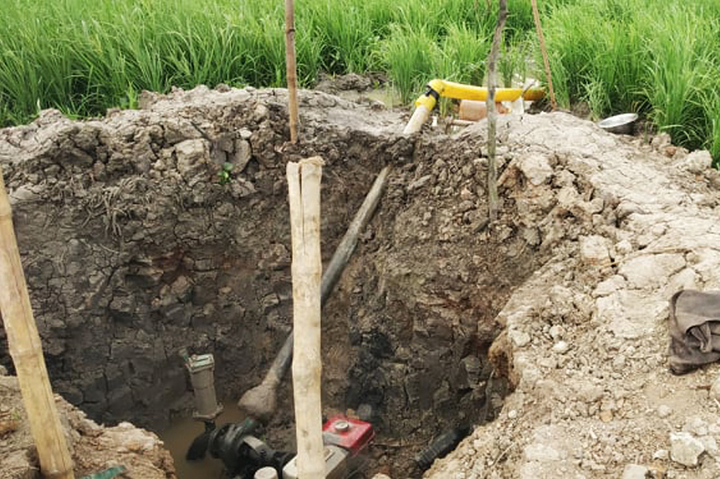The Barind Tract in Bangladesh risks desertification in the near future unless indiscriminate abstraction of groundwater is stopped now, writes Aminul Islam Tanmoy.
Abdur Rahim and his son were wandering aimlessly around their dried-up paddy field at Beel Bhatia in Chapainawabganj district. The farmers had planted Boro rice on 9 bighas (1.2 hectares) of land. But they were unable to irrigate the field; it's now a mosaic of cracked soil. Even boring a shallow pump down to 10-12 feet below ground didn't yield any water.
The water level in the Barind hill region of the northwestern district has been gradually depleting due to unbridled extraction of groundwater by mechanical means. Digging deeper through the natural layers of sand, soil, and bedrock, still no water for drinking or irrigation can be found. And thus, the people of the area are now facing chronic water shortage in the dry season.

During the monsoon flooding season, Beel Bhatia (a shallow lake) in Bholahat Upazila (sub-district) normally bursts its banks. But in the dry season, the earth around the lake cracks up from the intense summer heat. Aquatic and terrestrial plants and various species of animals and birds are under serious threat in the area, designated as a wildlife sanctuary, due to climate change and depletion of groundwater. As a result, innumerable biodiversity is being lost every day. Water grasses, once abundant around the lake, don't grow there anymore.
Another Boro farmer, Taiinur Rahman, explained that they could not extract any water for irrigation as the groundwater level has drastically gone down. As a result, rice paddies planted on thousands of acres have been lost. The noisy shallow pumps are now silent. The farmers are busy cutting the dead paddy to feed their cattle at home.
Nachole Upazila is known as a food surplus area in the Barind tract. But farmers, who depend on the crops in their fields, are terrified of the wraths of nature in the dry season. Paddy is cultivated on 14,626 hectares of land which now faces a water crisis. The soil level is sinking, and even digging down to 200-250 feet yields no water for irrigation.

According to information provided by the Barind Development Authority, the District Public Health Engineering Department, the local Water Development Board, and other offices dealing with climate change, the Barind tract risks desertification in the near future unless such indiscriminate abstraction of groundwater is stopped now.
Bholahat Upazila Fisheries Officer Waliur Rahman believes that if the authorities take up a project to build a dighi (reservoir), then water can be saved for agriculture, aquatic plants and native fish species flourish again.
The agriculture official said that the impact of climate change is being felt in the Barind area, heatwaves in the summer months of Chaitra-Baishakh ruin the soil and the lives of people.
Beel Bhatia is not the only palace suffering from such extreme effects on nature. The Pagla is a branch of the Padma river that flows through Shibganj Upazila in Chapainawabganj. The river, whose name means "crazy" in Bangla, is turbulent during the monsoon season, but it turns into a narrow stream in the dry season.
Shafiqul Islam, executive engineer of the Barind Multipurpose Development Authority (BMDA), said there is favouritism when installing deep tube wells without following the rules and regulations. Due to this, the people of the area are facing problems with water. This has adversely affected nature, while deforestation is partially responsible for the environmental disaster.





